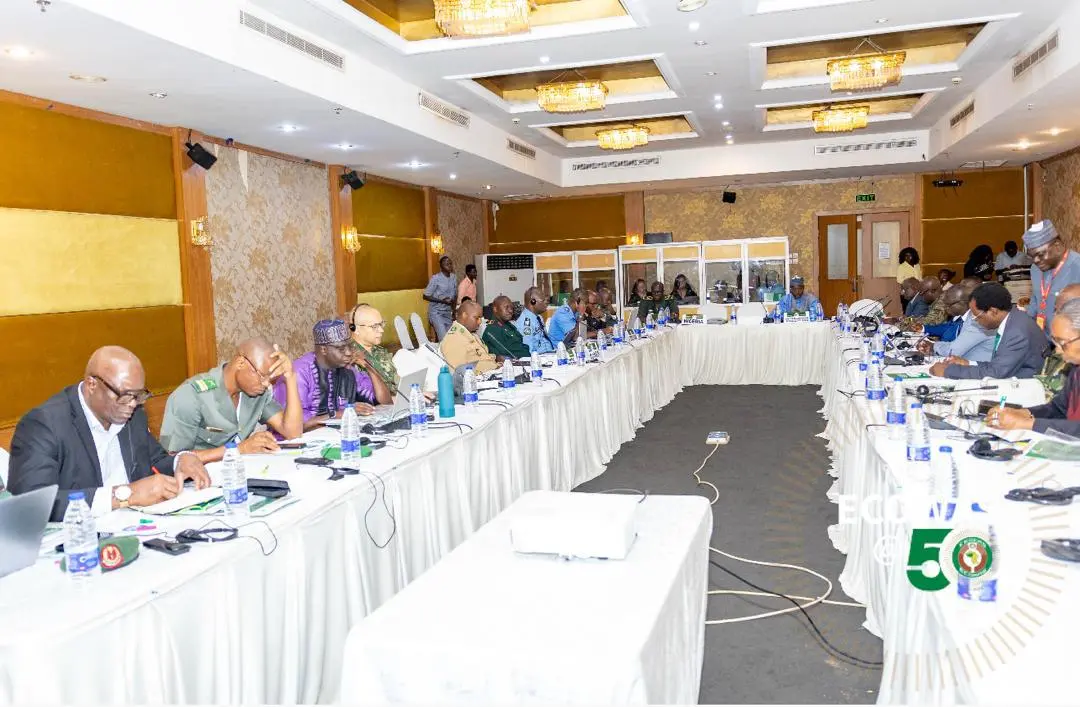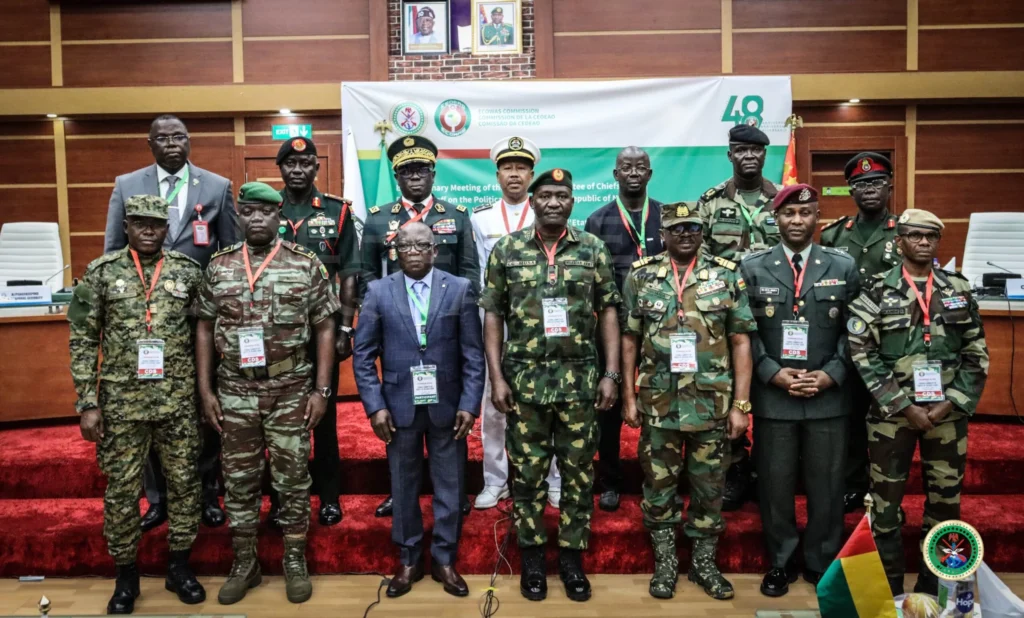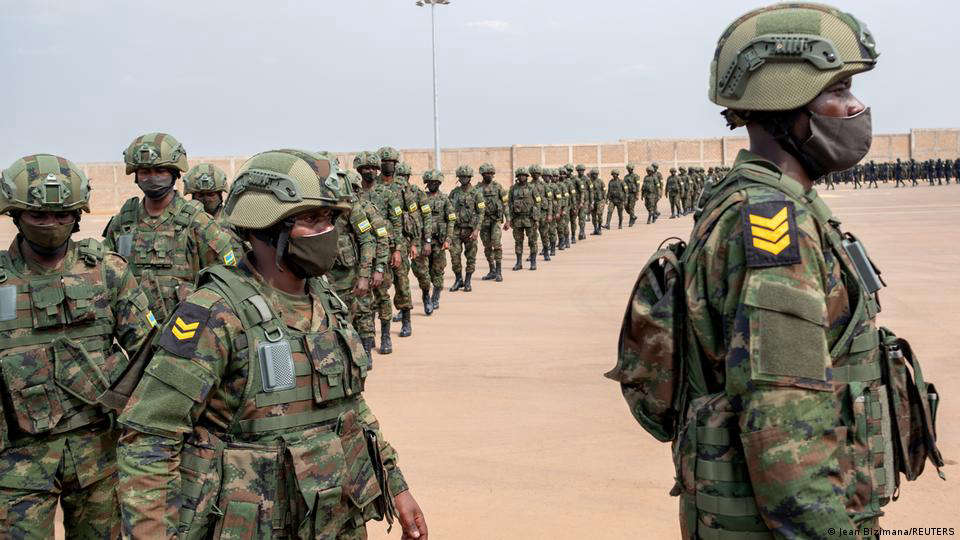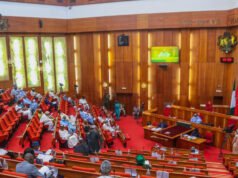In a significant stride toward enhanced regional security, the Economic Community of West African States (ECOWAS) has officially endorsed a comprehensive training policy for its Standby Force. Delegates from across West Africa convened in Abuja from 16–17 July 2025, for a two-day Governmental Experts’ Validation Meeting. Their goal: to seal a unified framework that ensures the region can deploy a rapid, coherent peacekeeping mechanism.
Table of Contents

A Landmark Gathering in Abuja
The meeting brought together a diverse assembly of military, police, and civilian training specialists from the bloc’s 15 member countries, alongside ECOWAS technical teams and leading international partners. Backed by the ECOWAS Directorate of Peacekeeping and Regional Security, the group is charged with drafting a policy that melds strategic preparedness with operational unity.
At the opening ceremony, Major General Umar Abubakar, an eminent figure within Nigeria’s Ministry of Defence and its Director of Peacekeeping and Regional Security, described the moment as transformative. “Today, we are turning vision into action,” he remarked. “Our task is to transform ECOWAS’s Standby Force from concept into capability—quick, cohesive, and ready to preserve peace across the region and contribute to continental stability.”
Defining a Modern Peace Support Doctrine
Delivering a keynote address, Dr. Sani Adamu, Acting Head of ECOWAS’s Peace Support Operations Division, emphasised the policy’s broader ambitions:
- Institutionalising human rights and civilian protection
- Mainstreaming gender throughout peace-support training
- Embedding post-conflict recovery in operational planning
He said, “This policy is not just a document—it’s a backbone for a professional, responsive force capable of adapting to today’s complex security landscape.” Indeed, developing a consistent training doctrine has been an ECOWAS aim for over ten years.
Strategic Framework: From Regional to Continental Reach
Key sessions featured strategic plenaries and breakout workshops focusing on:
- Clear standards for military, police, and civilian training
- Defined responsibilities at the regional, national, and operational levels
- Measures to ensure accountability, inclusivity, and standardisation
Pledging to complement the African Standby Force framework, the policy aligns regional readiness with African Union benchmarks, reinforcing West Africa’s role in continental peace operations.

Global Technical Backing
Highlighting the strong collaboration underpinning this effort, Mrs. Yvonne Akpasom—representing GIZ under the ECOWAS Peace, Security & Governance (EPSG) program—affirmed Germany’s commitment. “Our goal is a training policy that’s operationally sound, globally compliant, and regionally relevant,” she said, lauding the expertise ECOWAS applied to the validation process.
This initiative falls under the EPSG project, co-funded by the European Union and the German Federal Ministry for Economic Cooperation (BMZ), and executed by GIZ. Additional support from Expertise France and AECID (Spanish Agency for International Development Cooperation) further strengthened consultative efforts.
Meeting the Region’s Pressing Security Needs
Security experts say this endeavour comes at a critical time. West Africa faces persistent threats—from escalating jihadist insurgencies in the Sahel to widespread banditry and kidnappings across coastal states. Recent years have seen dramatic instability, including unconstitutional regime changes in countries such as Mali, Burkina Faso, and Niger. In response to the 2023 coup in Niger, ECOWAS activated a “Ready Force” under the Standby Force framework, though a large-scale deployment never occurred.
ECOWAS leaders, including Nigeria’s President Bola Tinubu, have urged quick operationalisation of the Standby Force, arguing that only a united, prepared regional military can address transnational threats effectively.
Key Outcomes and Next Steps
At the meeting’s close, the validation of the draft policy marked a milestone:
- Final draft approved by technical delegates
- ECOWAS Commission urged to officially adopt it
- Member states tasked with developing national training programs
- Donors and partners to define roles in logistics, funding, and capacity-building
This process is expected to feed directly into implementing ECOWAS Vision 2050, which envisions a conflict-free, integrated, and resilient West Africa.
Why It Matters
- Rapid Crisis Response – A fully trained standby force could shorten response time to insurgencies, coups, and large-scale civil unrest.
- Unified Training Standards – A common doctrine ensures interoperability among military, police, and civilian units across borders.
- Ethical Imperative – Training on gender sensitivity, human rights, and civilian protection reflects a commitment to humane and credible missions.
- Continental Cooperation – Aligning with the African Standby Force strengthens ties with pan-African peace initiatives.
- Enhanced Donor Confidence – A validated framework strengthens the case for sustained investment from international partners.
Looking Ahead: Operationalising the Force
With its policy blueprint approved, ECOWAS now faces the real test: translating words into action. This requires:
- Formal ratification by ECOWAS’s governing bodies
- Budget allocation and logistics planning
- National program design and standardised training exercises
- A robust regional command and control structure
- A phased rollout with evaluations and readiness assessments
- Provision of equipment, facilities, and funding support
The EPSG, EU, BMZ, GIZ, Expertise France, and AECID are expected to aid implementation—including pilot deployments—helping the ESF become a formidable regional tool.
Voices Reflecting Regional Aspiration
Major General Umar Abubakar tied the initiative directly to ECOWAS’s larger mission. “Convert this concept into reality. Prepare for swift responses to conflicts. Stand firm for regional stability and serve the African Standby Force.”
Dr. Sani Adamu echoed that sentiment, calling the policy “our shared vision taking shape—integrating rights, gender, civilians, recovery, and professional excellence.”
Mrs. Akpasom praised ECOWAS’s vision, affirming global alignment and operational readiness.
Pope Francis, ECOWAS and the Future
While ECOWAS navigates immediate threats, broader aspirations lie ahead. Its Vision 2050 foresees a region free from arbitrary borders, unified in peace, prosperity, and democratic resilience. This new training framework symbolises a major step toward that reality.

In Conclusion
ECOWAS’s endorsement of this Standby Force training policy—now officially validated in Abuja—signals a shift from conceptual agreements to concrete security planning. It represents a regional commitment, technical cooperation with global partners, and a proactive response to one of Africa’s most pressing challenges.
If implemented as designed, the policy could reshape the region’s ability to handle crises—from insurgencies to coups—while fostering a spirit of shared responsibility and integrated peacekeeping. Getting this training policy off the page and into action is not just a bureaucratic step; it’s a statement of regional unity and resolve.
Join Our Social Media Channels:
WhatsApp: NaijaEyes
Facebook: NaijaEyes
Twitter: NaijaEyes
Instagram: NaijaEyes
TikTok: NaijaEyes
READ THE LATEST EDUCATION NEWS





